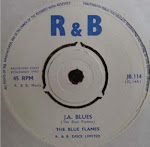Brian Kotz (Brian Betteridge of Back to Zero) interview by Alex M Franquet
- How did you become a mod?
- I had developed an interest in Mod through my teens. I was a fan of 1960's music, and I'm sure this had something to do with hearing music being played round the house when I was growing up by my brother, who is 13 years older than me.
I was aware that he had been a Mod and I had taken an interest in this.
- What kind of records did your brother left you at home. Do you remember some of those records? Was that mainly black music?
- Yes, from around 1963/4 onwards, my brother Alan's record collection consisted almost entirely of black American R&B/soul.
Here's a selection of the classics he bought at the time:
Soulful Dress - Sugar Pie DeSanto
You're My Remedy - Marvelettes
What's A Matter With You Baby - Mary Wells & Marvin Gaye
Dimples - John Lee Hooker
In Crowd - Ramsey Lewis
Shame Shame Shame - Jimmy Reed
Always Something There To Remind Me - Lou Johnson (the original)
Shop Around (EP) - Miracles
Get Out My Life Woman - Lee Dorsey.
The one non-R&B single he owned was "Sins of a Family" by P.F. Sloan, which was massive on the Mod scene - they recognised a soulful performance when they heard one.
Of course, he had more well-known stuff too, like 1-2-3 and Shotgun Wedding.
-What did you brother told you about the Stanford Hill Mod scene and Marc Bolan? Did he met Bolan?
-Although we moved from Stamford Hill to the suburbs when I was a baby, Alan still went to school further into town, so his social life continued to revolve round his former locality.
The main meeting centre was an amusement arcade known as the "Shtip", but they wouldn't stay in the area to socialize.
They had shops and clubs to move on to elsewhere. A lot of the early Mods had relatives in the "rag trade", so good suits etc were within their grasp, but they had their favourite shops.

Alan always bought his shoes at Rael, which eventually became Ravel.
He used to go and see loads of bands with his friends, but they didn't buy their records, preferring to buy original U.S. stuff; my analysis is that this is a reason that some of the best groups had little commercial success, because they were more of a live attraction.
His faves were Downliners sect, who he used to see every week at studio 51 off Charing Cross road, and Zoot Money's Big Roll Band.
He knew who Mark Feld (later to be Marc Bolan) was, and saw him around, but didn't know him personally, although he had friends who knew him.
Ironically, I met Bolan whenI was 14, (2 years before his death)at a TV Pop Quiz for teenagers that I took part in, but I didn't ask him any of the questions I'd have liked to, because I was too nervous and lost for words!
- Can you explain us some anecdote or funny story from the sixties that your brother told you?
- Well, Alan claims that the original reason that the early Mods started to take speed, was because after being up allnight at a club like the Flamingo, many of the guys played football in youth leagues on Sunday mornings.
They realised at some point that products like Dexedrine and Drinamyl could keep them awake right through the weekend, so as well helping them through the night, they could carry right on and play the football match.
They must have been fast-moving games!
- I think you know an interesting story about a New Musical Express article.
- Yes, in april '79, NME published the amazing "Young Mod's Forgotten Story", about the early Mods, as part of their Mod special.
Alan knew nearly everyone who was mentioned, and was annoyed that he wasn't; one guy who was written about was called Malcolm Chiswick. When he saw that name, he said, "Malcolm wasn't even a Mod, he just used to sit in the Wimpy Bar in Oxford Street all night when we went on somewhere else"!
- I think they hated a lot a certain band.
- One group that him and his friends DIDN'T like when they saw them was The Rolling stones at The Crawdaddy Club.
They walked out, because the group waved their hands when they played "Bye Bye Johnny", and they thought it was silly!
- What happened to the mod scene in that area?
- I think that one reason that whole period came to an end for the Stamford Hill Mods is because of the very individuality that set them apart at the beginning.
They wanted to get out of the area and move somewhere nicer, do their own thing and get on in their lives, like any working-class kids.
I intend to find out more about everything eventually, as not enough has been written about them yet.
- And your brother, could he imagine that mod would last forever, until today?
- I'm sure that my brother didn't stop once to think whether Mod would last, as he was too busy living it!
I suppose that I may have given it a bit more thought in '79 - after all, we were building on the previous scene.
I remember a lot of cynicism at the time, of people saying all the old crap about something coming along and replacing it, but of course that missed the point.
Mod has had, and continues to have, a lasting influence on so much beyond its own scene, and elements of it will be around forever, but I'm telling this to someone who already knows that!
Whether we knew that in '79 is another thing. I'm sure we'd have hoped so.




No comments:
Post a Comment